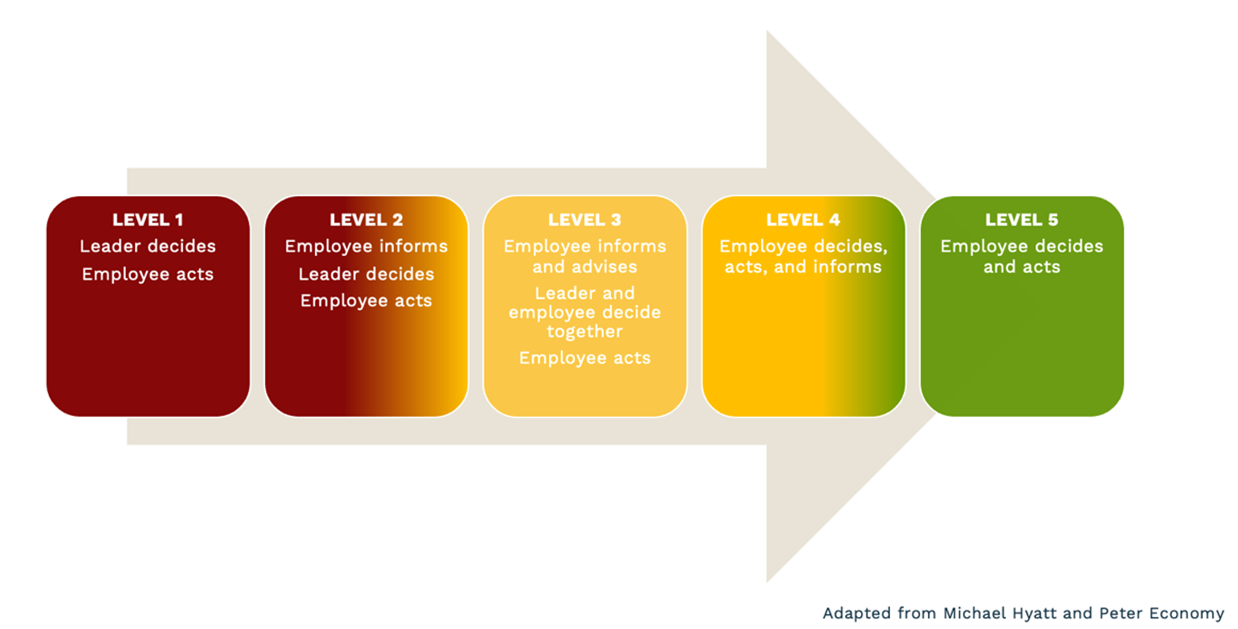Delegation. It’s a two-way street.
If you’re a manager or leader, it’s a way to empower your team and help your direct reports grow, develop, and operate more autonomously. It’s also a means to balance your workload and survive today’s fast-paced, always-too-much-to-do workplace. If you’re a direct report, it’s an opportunity to evolve as a professional, expand and maximize your potential, and satisfy your hunger for interesting work and more responsibility.
What I’ve noticed in my years of leadership coaching and training, however, is that delegation is also one of those evergreen topics. Inevitably, at every level of leadership, it’s a skill that continues to need attention and nurturing—a muscle we must continue to exercise and not allow to atrophy. And, moreover, I’ve consistently noticed there is a varied understanding of how leaders actually define the word delegation.
In our firm’s manager training courses, we define delegation as assigning a task or responsibility along with the support and authority to see that it is accomplished. The definition continues with stating that delegation happens when individuals are set up and empowered to take control and get the job done.
What I’ve noticed is that for many leaders and managers, the definition often ends after the word “responsibility” in the first sentence. They are inclined to forget the rest of the definition that involves support, authority, and empowerment. It’s often at this exact point where miscommunication, misunderstanding, and misalignment surface, and cracks begin to form within the relationship. To prevent this from happening, it’s imperative that leaders evaluate what supporting their direct reports and teams looks like, including what they can do to grow trust, confidence, and autonomy within the relationship. Without these key ingredients, they risk mandating to our teams more often than delegating. This leaves tenuous deficits within relationships that frequently hinder the chances of everyone’s success and negatively impact the overall health and vitality of everyone involved.
So how can we delegate better? How do we translate good intentions into consistent action? One way is to think of delegation as not only a skill, but a series of levels.
The Five Levels of Delegation
The graphic below serves as a model for a better pathway to delegation:

In simplest terms, as we move from left to right across the spectrum, or from red to yellow to green, we move from a state of authority—the leader telling the employee what to do—to states of autonomy and empowerment where the employee is able to discern and act on their own. As we do so, the following steps are fundamental to our success:
Moving across this model to levels four and five, it’s important to remember that this kind of independence can’t exist without an environment of safety and trust. Over the years, these two words have been common wellsprings for a host of problems when in deficit, and delegation is no exception. Taking the time to communicate deliberately, build rapport, and overall, create an atmosphere of safety and well-intention in our relationships are crucial to establishing the kind of trust that will help us delegate efficiently and effectively.
So, what can we do as leaders to create a sense of safety and trust within our organizations?
These foundational behaviors are a good place to start:
Finally, keep in mind that it’s vital to maintain a delicate balance between “I don’t want to micromanage” and not being involved at all when we have a group of people working under an aligned set of expectations and deliverables. This is best done when we work on cultivating an open, healthy communication pipeline with the people we lead, as everyone has different needs in their efforts to be successful. When this balance is struck, it’s a win for everyone: we feel more vital in our role as leaders, the expertise and confidence of our teams grow, and the greater ecosystems within our organizations thrive.
If you like to learn more about delegation, please check out the recording of my HRCI Alchemizing HR webinar titled “Delegation and Accountability in a High-Volume Work Environment.”
Joe LaDuke is Vice President, Coaching & Consulting Services at Dion Leadership. He partners with organizations to craft solutions to their leadership and organizational development needs.